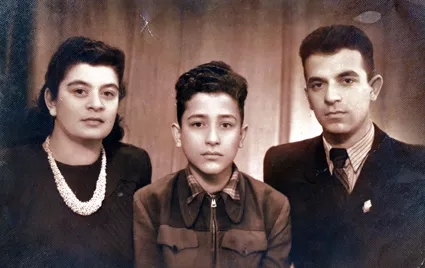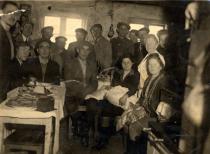From left to right: my sister Chana, my brother Avigdor Shteinas and I. The picture was made in early 1950s in Siauliai.
There was a cooperative trade in Siauliai and I got the offer from there in 1957. Practically I and a Jew from Vilnius founded that organization. At first, I was HR manager with a skimpy salary of 640 rubles, but still it was a big help for the family. Then I was transferred to the position of a commodity researcher. It was an interesting job. I traveled on business throughout Lithuanian, entered into deals, had meetings. In 1957 I became the candidate for the communist party, and joined it in a year. In a while the director of our organization was fired for abuse and I was named acting director for the period of liquidation. I showed such a good performance that the company was not closed down, but reorganized. I became the director of this enterprise. The only condition was that I should get education. No matter whether I wanted it or not I had to enter Vilnius college. The person in charge of extramural studies came over in Siauliai to talk me into studying there. It was she who helped me enter and finish the college. After that I entered extramural department of Moscow economical institute and graduated from economics department. Before graduation from the college in 1964 I was elected chairman of Siauliai regional consumers' council. I had worked there for 30 years until retirement. In 1996 I retired.
My sister Chana and my brother Avigdor worked at the tannery owned. In 1956 Chana got married. Her husband was son of father's friend Kasimiras. His name was Vitautas. They fell in love with each other. It was a true love. Vitaustas's mother was not alive, and Kasimiras wanted to be in relations with our family. Despite being friends with Kasimiras, my parents were flatly against Channa's marriage with Lithuanian. Chana still married Vitaustas after father died. They decided to live for Carelia. I bore grudge against sister not for her marriage with a Lithuanian, but for leaving mother in hard minute. I even did not respond to her letters, which she sent in my military unit.
Once in 1959 I came home from work. An unfamiliar lady was sitting at the table with my mother. Mother said- have a look. It was my sister Chana. She was pregnant. She came fore a visit with her husband from Carelia and said how hard it was to live afar from home. Having forgotten the past, I suggested that they should live with us. Chana gave birth to a son in Siauliai. He was given Lithuanian name Kestas. At that time I held the position of the chairman of consumers' council and started thinking of asking for apartment for sister's family. I walked from one authority to another and finally mother and I were given two rooms in the communal apartment, and Chana staid in ours with her family. I loved my sister very much. Unfortunately, she died in 2001. Her husband Vitautas and son Kestas are living in Siauliai. We often meet them. Kesas has two daughters- Eric and Elbert.
Avigdor married a Jewish lady Luba in 1962.He has two children: daughter Liya, 1963 and son Ilia, 1970. In late 1980s Liya and her husband left for the USA. The rest of the family- Ilia with his family, Avigdor and Luba moved to Israel in 1990. I was seeing my brother in Moscow, I sobbed like a little boy, thinking that I would never see him again. In 1991 I went to him for a visit. At first, Avigdor was a worker at the plant, but Luba found a job in line with her profession, a nurse. Brother and his wife are now living in Petah Tiqwa. My wife and I go to Israel. Brother comes to Lithuania. We write letters to each other and know what is going on in our lives.





















